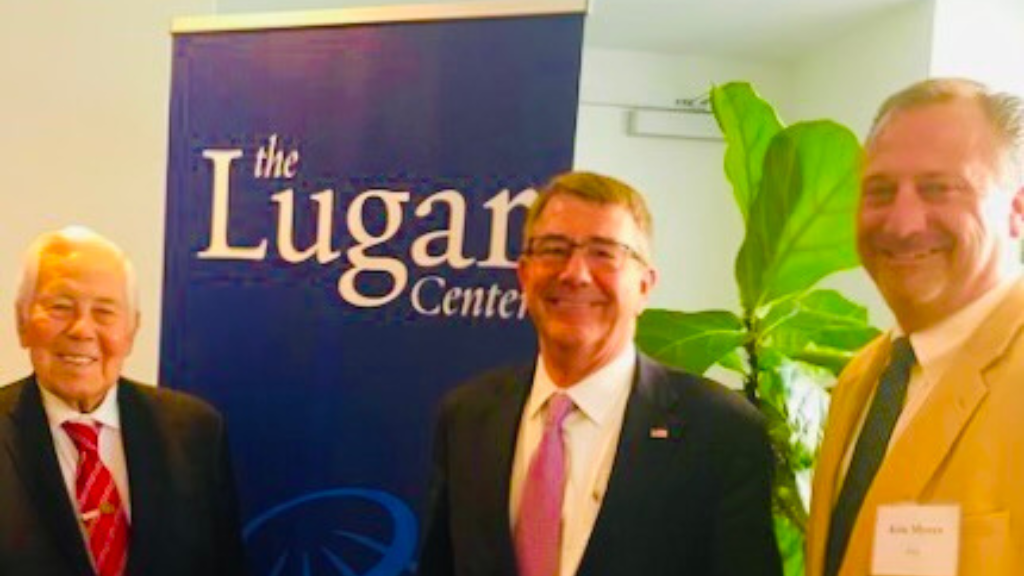The Passing of Former Secretary of Defense Ash Carter

By Ken Myers, President, CRDF Global
When historians look back at the post-Cold War era, they will focus on the visionary leaders who reimagined the international security landscape – leaders like Senators Dick Lugar and Sam Nunn and former Secretaries of Defense Bill Perry and Ash Carter.
I had the great pleasure of working directly for both Senator Lugar and Secretary Carter. They were committed to making the world a safer place. Our country mourned the passing of Senator Lugar in 2019, and last week we lost Secretary Carter.
One of the cornerstones of the post-Cold War security environment is the Nunn-Lugar Cooperative Threat Reduction Act. What many people don’t know is that Secretaries Perry and Carter, who were then professors at Stanford and Harvard Universities respectively, were critical contributors to this landmark legislation. It was their vision introduced in the book, A New Concept for Cooperative Security, that was the foundation of the Nunn-Lugar Program.
Senators Lugar and Nunn hosted a series of events for their colleagues in the Senate and invited Perry and Carter to make presentations to secure support for the legislation. Their compelling arguments delivered a strong bipartisan vote of support for Nunn-Lugar. While the Senators continued their advocacy in Congress, Perry and Carter joined the incoming Clinton Administration. Perry was confirmed as Secretary of Defense and Carter became the Assistant Secretary of Defense for International Security with oversight of the new Nunn-Lugar Program.
Carter established and guided the program in the early years and even after he left government service, he worked closely with Senators Lugar and Nunn to refine the program. Under his leadership, the Nunn-Lugar program removed and eliminated nuclear weapons in Russia, Ukraine, Belarus, and Kazakhstan.
Carter returned to the Pentagon in 2009 as Undersecretary of Acquisition, Technology and Logistics under President Obama. Among his many responsibilities in that role, he had oversight of the Defense Threat Reduction Agency, the primary implementer of the Nunn-Lugar Program. I had the great honor of being chosen by Carter to be the Director of DTRA and support his vision for the program for seven years.
Secretary Carter was a brilliant leader. His mastery of policy and technology was second to none. I recall briefing him on the nuclear reactor meltdown at Fukushima, the elimination of chemical weapons in Libya, the response to the Ebola outbreak in Africa, and the removal and elimination of the Syrian chemical weapons stockpile. His penetrating questions, grasp of complex situations, and encouraging leadership never failed to impress.
During a tense moment in the planning to address the Syrian CW threat, we were debating the pros and cons of removing the weapons and destroying them on a ship or eliminating them on the ground in Syria. Carter, then Deputy Secretary of Defense, listened intently and asked probing questions about the technological and logistical challenges. He endorsed the DTRA proposal to neutralize Syria’s stockpile on board the USS Cape Ray — something many thought was impossible. When we were done, he closed his briefing book, stood up, and with a broad smile said, “What a quality problem to have: Eliminating the weapons that another country produced to attack us and with their permission! Get it done. Let me know what you need, and you will have it.”
Carter left the Pentagon in 2013 but would return as Secretary the following year. During the interim, I called him just to let him know that the Syrian mission he authorized had been completed. His words were vintage Ash Carter: “Great! Well done. What’s next on the list?”
We mourn Ash Carter’s passing but celebrate the vision, concepts, encouragement, and tools that he gave us. We can best honor him by using those gifts effectively, approaching every situation with creativity, and continuing his life’s work to make the world a safer place.



